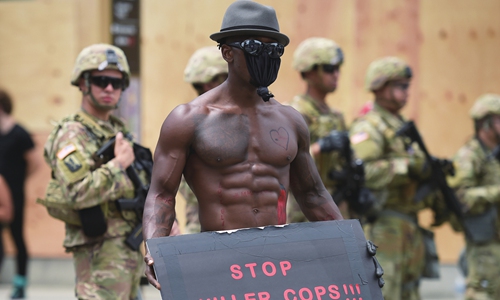
A protester holds a sign in front of Army National Guard troops at a demonstration over the death of George Floyd in Hollywood, California on Tuesday. Photo: AFP
Can political correctness solve deep-rooted social problems such as racial inequality in the US? I suppose Americans are in the best position to answer this question, and a majority of them could say, "No."
As the flames of anger fueled by George Floyd's death continue to spread in the US, political correctness has triggered a series of incidents - a statue of a Confederate general in Virginia was toppled by protesters; Friends co-creator Marta Kauffman expressed regret for the lack of racial diversity on the TV series; top Pentagon leaders said they were open to discussing renaming 10 US Army facilities; and Gone With the Wind, the US Civil War epic considered a classic of American cinema, has been temporarily pulled from HBO Max.
However, all of these are only temporary relief that will definitely fail to touch the core of the deep-rooted racial inequality in the US.
It took the US 100 years to outlaw racial segregation after slavery had been abolished in the country. Another half century has passed, but the US of 2020 is still replaying the scenarios that were commonly seen in 1968. Worse, from some perspectives, ethnic minorities in today's US suffer more than ever.
The efforts of countless pioneers at the cost of their lives for racial equality seem to have ended up in vain. No matter how glorious political correctness looks like, the US has never been spared from racial inequality. Under the guidance of political correctness, neither catering to public mood nor issuing statements can dispel the haze of racial inequality.
Floyd's death has fanned the flames of fierce protests against racial discrimination, but the movements cannot budge the current US government. US President Donald Trump used discriminatory words such as "lowlife and scum" to describe protesters, continuing to stir the sensitive nerves of racial inequality. Although some senior Democrats vowed to press legislation to undo systemic racism, they haven't brought about anything pragmatic.
Meanwhile, the racial equality issue has been increasingly politicized in the US and turned into a tool for politicians to gain more political interests. Politicians are taking advantage of the issue to gain interests rather than to strive for the rights of minority groups.
Political correctness has just veneered and whitewashed the problems at the surface but never truly addressed the root of the problems.
Political correctness is no cure to racial inequality. As long as US politicians politicize the problem and make use of it for self-interests, ordinary Americans will not be able to enjoy real racial equality, and the racism crisis will reappear again and again.
Under the current US political structure, the problems of racial inequality are nearly impossible to be solved. Conflicts between Republicans and Democrats are becoming extremely intense. They will not compromise. Worse, both parties don't even dare think about compromising. Hence, the impetus and vitality for reform are lost in the day-to-day party conflicts. But if things continue this way, will the US have enough political resources to solve this social problem instead of being completely torn apart by it?



